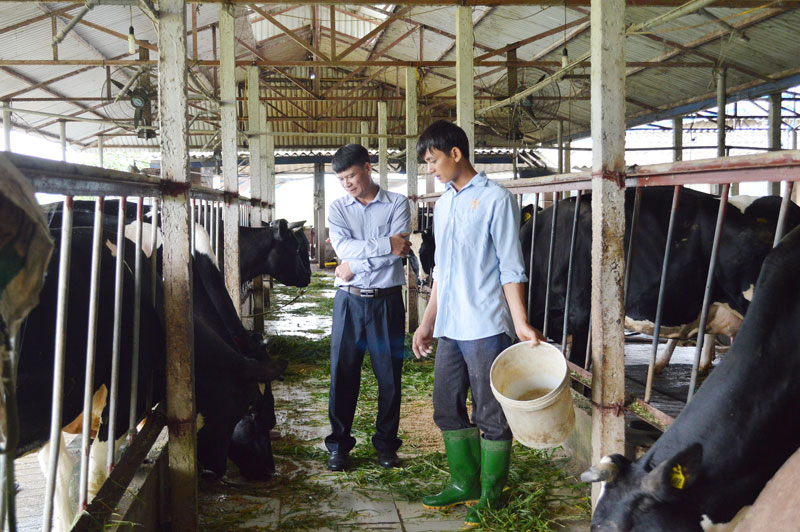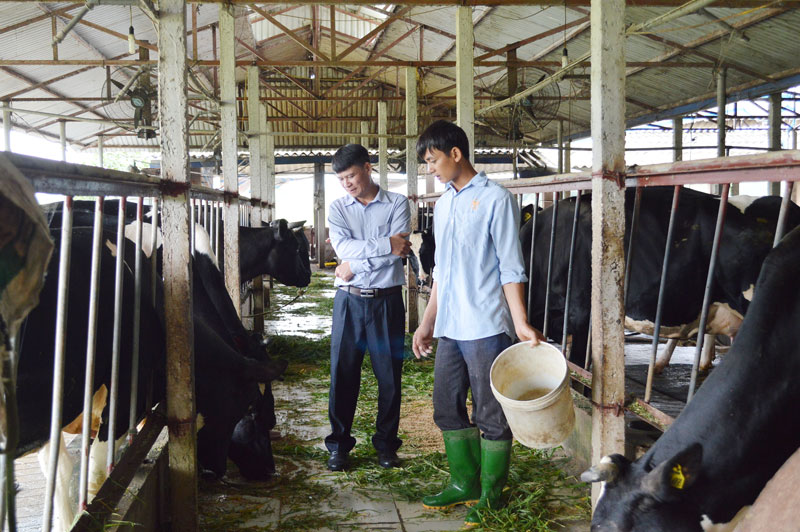
(HBO) – Developing the private economy sector into an important motivation of Vietnam’s socialist-oriented market economy is a focus of Resolution No.10-NQ/TW dated June 3, 2017 adopted by the 5th plenum of the 12th Central Committee of the Communist Party of Vietnam.
To implement policies
of the Party, State and Government on the development of the private economy,
Hoa Binh province has taken various measures to facilitate the sector to thrive
and become an engine for the entire economy.
 A
household in Nhuan Trach commune, Luong Son district, develops
milk cow farming.
A
household in Nhuan Trach commune, Luong Son district, develops
milk cow farming.
Since 2017, the
province has attracted 211 investment products, including 17 FDI projects. So
far, 580 projects have landed in the province, of which 540 are domestic
projects worth close to 84.74 trillion VND while the remainders are FDI
projects with a combined registered capital of 575.4 million USD.
Local industrial parks
are home to 95 licensed projects, including 24 FDI projects worth nearly 500
million USD and 71 domestic investment ones with total registered capital of
close to 7.27 trillion VND. Some 55 projects have become operational, creating
jobs for about 20,000 workers.
Also during the
period, over 1,300 new enterprises have been established with total registered
capital of roughly 6.98 trillion VND and 428 firms set up representative
offices and branches in the province.
To date, Hoa Binh has
3,800 companies registering total capital of more than 40 trillion VND, 387
cooperatives, one cooperative union and over 34,000 household businesses.
However, the growth rates
of local firms are slow and most of them are small- and medium-sized. To fuel the
development of the private economy, the province will institutionalise the
government’s policies on developing the private economy in a way that suits
local context, and develop its own incentives and policies to boost the growth
of private companies.
The province also
plans to support the growth of agricultural cooperatives and adopt special
incentives to attract investors. It will accelerate public administrative
reforms and provide the best conditions for enterprises to expand production. It will also promote
dialogue with enterprises and promptly help them solve difficulties./.
According to data from the Hoa Binh Provincial Party Committee, the industrial production index for the first six months of 2025 is estimated to have increased by 20% compared to the same period last year. This marks the highest year-on-year growth rate for this period since 2020.
In the first six months of 2025, Hoa Binh province’s export turnover was estimated at 1.145 billion USD, marking an 18.11% increase compared to the same period in 2024. Import turnover was estimated at $ 804 million, a 17.15% increase, which helped the province maintain a positive trade balance.
The lives of the ethnic minority farmers in Tan Lac district have gradually improved thanks to the new directions in agricultural production. This is a testament to the collective strength fostered through the professional associations and groups implemented by various levels of the district’s Farmers’ Union.
With the motto the "product quality comes first,” after nearly one year of establishment and operation, Muong village’s Clean Food Agricultural and Commercial Cooperative, located in Cau Hamlet, Hung Son Commune (Kim Boi district), has launched reputable, high-quality agricultural products to the market that are well-received by consumers. The products such as Muong village’s pork sausage, salt-cured chicken, and salt-cured pork hocks have gradually carved out a place in the market and they are on the path to obtaining the OCOP certification.
In the past, the phrase "bumper harvest, rock-bottom prices" was a familiar refrain for Vietnamese farmers engaged in fragmented, small-scale agriculture. But today, a new spirit is emerging across rural areas of Hoa Binh province - one of collaboration, organisation, and collective economic models that provide a stable foundation for production.
Maintaining growing area codes and packing facility codes in accordance with regulations is a mandatory requirement for agricultural products to be eligible for export. Recently, the Department of Agriculture and Environment of Hoa Binh province has intensified technical supervision of designated farming areas and packing facilities to safeguard the "green passport" that enables its products to access international markets.



 A
household in Nhuan Trach commune, Luong Son district, develops
milk cow farming.
A
household in Nhuan Trach commune, Luong Son district, develops
milk cow farming.